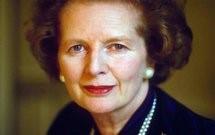 Former British Prime Minister Margaret Thatcher died Monday. The Iron Lady's leadership at a critical juncture in the latter phase of the Cold War tested the notion that personalities matter little in geopolitics. Few contemporary leaders better deserve the obituary that vaunts the individual over history.
Former British Prime Minister Margaret Thatcher died Monday. The Iron Lady's leadership at a critical juncture in the latter phase of the Cold War tested the notion that personalities matter little in geopolitics. Few contemporary leaders better deserve the obituary that vaunts the individual over history.
In the popular imagination -- at least on the political right -- Thatcher almost single-handedly reversed Britain's post-imperial gloom. She reinvigorated the American alliance on which her country's security depended and helped the Americans to bring down the Soviets. She shored up Britain's collapsing global role by defending the Falklands. Domestically, she confronted the struggle between austerity and insolvency that Europe and the developed world now face and insisted on painful economic restructuring. Much of the animosity toward her stems from these reforms, which were perceived on the political left as cutting against the postwar social compact that the British government had made with its people. But she built up enough political will to manage the opposition and survive for a long term in office.
On the international stage, however, Thatcher's foreign policy owes less to Thatcher than to Britain's grand strategy. Historically, the Roman invasion, the Norman invasion and the Spanish Armada exemplified the only existential threats an island nation could face. By the time Queen Elizabeth fended off Spain, England explicitly recognized its need to prevent any power from dominating its neighbors and became capable of amassing a navy and transporting troops across the English Channel. This strategy required dividing Europe, not in order to conquer it (England gave up her continental aspirations in the 15th century), but rather to prevent the possibility of being conquered. The great wars of the 19th and 20th centuries reinforced this strategy.
In Thatcher's time, the Soviets posed the threat of overwhelming Europe. The question wasn't what role to play, but how to play it. The ideological account presents Thatcher as a stalwart anti-communist, which she was, but her foreign policy reflected British strategy rather than personal opinion. Britain's relationship with the Continent clarifies this point. In 1988, as the Soviets fell apart and the European Economic Community started to evolve into the European Union, she gave a speech in Bruges, saying, “We have not successfully rolled back the frontiers of the state in Britain only to see them re-imposed at a European level, with a European superstate exercising a new dominance from Brussels.”
The European project sought to unify the Continent and cede national prerogatives to supranational institutions. That fact alone clashed with time-tried British maxims. It didn't question whether the French and the Germans had good intentions; it questioned whether any British leader could rely on something as mutable as human intention to pursue the nation's interests. The same reasoning supported Thatcher's objections to German unification, though in that area her power did not match her ambitions. Nevertheless, her successors, including those in the rival Labor Party like Tony Blair, shared her position of encouraging freer trade with Europe while opposing political integration that would entail sacrifices of national sovereignty.
The world Thatcher left behind is very different from the one she sought to influence. Russian power has rebounded and the eurozone is coming apart at the seams. The British public, watching the debt crisis, is glad to have avoided the monetary constraints the euro would have imposed. Amid this crisis, Prime Minister David Cameron, much criticized for being euroskeptic, departed Monday to meet with his counterparts in Spain, France and Germany. While hoping that Europe can revive growth, Cameron has the opportunity to loosen commitments that restrict Britain's sovereignty and room for maneuver. The media will watch how Cameron gets along with Spanish Prime Minister Mariano Rajoy, French President Francois Hollande and German Chancellor Angela Merkel. We will look to see how Britain walks the line between its divergent economic and political interests, as well as where and how the fissures among the EU states widen.
Courtesy : Stratfor (www.stratfor.com)